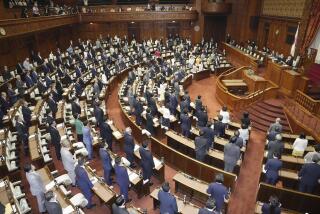Japan Opens to Scrutiny Under Freedom of Information Law
TOKYO â Outside Japanâs drab Foreign Ministry building stands a 200-square-yard prefab building with a small but significant plaque: âInformation Disclosure Room, Second Floor.â
Thanks to a freedom of information law that took effect this month, citizens can now obtain details of national civil servantsâ actions and the use of tax dollars at the Foreign Ministry and dozens other federal agencies.
When the law took effect April 2--nearly two years after parliament approved it--dozens lined up outside the Foreign Ministryâs makeshift room to file more than 600 requests for documents, seeking details such as the amount the agency spent on entertainment, the budgets for Japanâs embassies and the type of âgift moneyâ the ministry paid to guest speakers.
By the end of the first week, the government had received 4,769 requests--ranging from inquiries into medical equipment procurement bids at national university hospitals to business trip expenses for police administrators.
The new law came nearly three decades after the passage of the first significant federal âsunshine lawâ in the United States. Japanese activists hope that the law will open the back-room decision-making that has long frustrated journalists and public-interest groups here.
âWeâve been longing for this,â said Tatsuro Kuroda, director-general of the nonprofit Information Disclosure Citizens Center in Tokyo. âWe could never even request documents before.â
Which isnât to say theyâll actually get them now. Satoshi Shinkai, a lawyer spearheading the Nationwide Citizens Activist Council, said heâs skeptical that the government will actually turn over many of the records, such as those that disclose the particulars of recent Foreign Ministry scandals.
Many groups requested details of the more prominent misdeeds--including how one official stashed away funds to buy racehorses he named after his girlfriends.
A 45-year-old man reportedly asked the Land, Infrastructure and Transportation Ministry about a railroad accident involving his relatives 10 years ago. He wanted to evaluate discrepancies between the explanations given to his relatives and what the railway actually reported.
There are fears that many records have already been destroyed--or even lost in a massive government reorganization in January.
And there is much that is protected: According to one ministryâs Web site, the limits include information that âinfringes on corporationsâ and organizationsâ reasonable interests,â that âcauses damage to public security and social ordersâ or âthat could create unnecessary confusion among citizens or cause obstruction of administrative procedures or projects.â How those limits are interpreted remains to be seen.
But actually getting the records is almost beside the point, Shinkai said. The government is cleaning up its act by virtue of the fact that thereâs scrutiny at all, he asserted.
âIt prevents empty expenses, unless people forge documents, which is difficult,â he said. âFor instance, you must specify who . . . you went with on a business trip, and you canât get away with making it up as easily anymoreâ because someone might be checking.
Shohei Muta, who follows the freedom of information issue at the nonprofit Japan Center for International Exchange, has already noticed the difference over the last several months as preparations were being made for the lawâs implementation.
Bureaucrats are âmore cautious about transparency and accountability and more strict about records and evidence when we finish the job,â said Muta, whose center is involved with the government in several projects.
Kazuya Yamamura of the central agency coordinating the disclosure programs said that the government has been a bit overwhelmed by the volume of requests and that he wasnât sure how the ministry would cope. But in the second week, requests slowed to a trickle, he said.
Many of the countryâs prefectures passed freedom of information laws in the 1980s for their state operations, but the degree of cooperation varies by prefecture. Shinkaiâs group publishes an annual rating of the best and worst prefectures.
Theyâre getting progressively better, he said. Several years ago in Akita prefecture on northern Honshu island, officials forged expense documents but confused the real ones and the fake ones, Shinkai said. They inadvertently distributed the real ones. Ultimately, bureaucrats had to repay $30 million and the governor was forced to resign.
More to Read
Sign up for Essential California
The most important California stories and recommendations in your inbox every morning.
You may occasionally receive promotional content from the Los Angeles Times.










